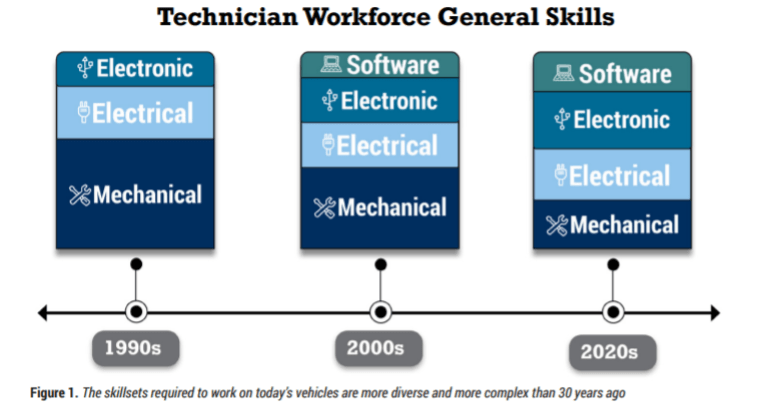October 21, 2020
The Effects of Connected and Autonomous Vehicles on the Middle-Skilled Workforce
The Minnesota Department of Transportation’s Connected and Autonomous Vehicle office (CAV-X) helps coordinate the Governor’s appointed CAV-X Council. Under the purview of the council are several committees. Patrick Weldon of Polaris and I serve as the co-chairs of the Workforce Development Committee. This committee presented at the September council meeting to all council members and some public members.
During that presentation, we had a guest presentation from Sarah Crane, who is the Research Project Manager from the Economic Growth Institute at the University of Michigan. Sarah had conducted research on technicians and others in the workforce, specifically around CAVs and the impacts on the workforce. Sarah presented her findings to the MN-DOT CAV-X Council meeting to a diverse group of stakeholders.
Sarah’s presentation had many aspects that caused everyone to stop and think about what our workforce is doing. One of the most compelling parts of the study is what research and survey respondents said on the topic of what skills technicians need and are going to need. The chart below shows the progression of what technicians 20 years ago needed, versus what skills they need today.
We all know that there are current workforce gaps in terms of both skill sets, quality, and quantity. While there are things we need to do right now, we absolutely need to focus and have discussions on the career pathways we build for the future.
As we move into a future where autonomous and advanced vehicles and transportation systems, both on and off the road, continue to grow and become more complicated, it is clear that we to keep certain things in mind and start to discuss them now, rather than waiting until later. This list of discussion items typically includes:
Prospective Students
- Where will they come from? Are high schools still the primary source of our technical college enrollment? Should we put more emphasis in the non-traditional student base? Are there adults in certain sectors of the transportation workforce in need of upskilling?
- What skills will they need before coming to my program? What systems are in place to build those prerequisite skills? Are those systems interconnected and communicating with the intent on building a quality pathway?
- How will I communicate the increased amount of technical skills in my program? How do I communicate with a local advisory committee or local school/college administration?
Curriculum
- What do I need to add or drop? Do I need more or less practice time to attain the skills that my local advisory committee (and program accreditation) say we need to be teaching? Do I need to still cover older topics, but with less time?
- Where am I going to get the funding for all this new stuff? What equipment or supplies do I need?
- What professional development do I need? Where can I get it? How do I disseminate that information to my students?
- Do fundamentals still matter? Should I consider emphasizing them even more?
- Do I need more perquisites? Should I have entry requirements to my program?
industry partnerships
- What do we need to do to have better partnerships? How do I approach stakeholders?
- How do we leverage existing relationships so there is a ROI for both of us?



You must be logged in to post a comment.